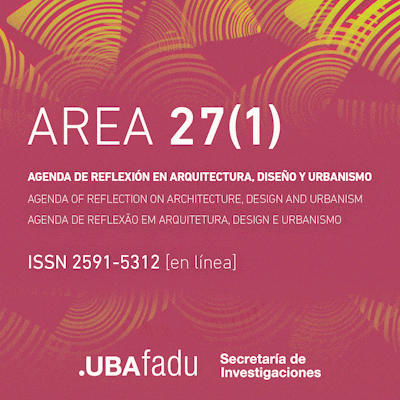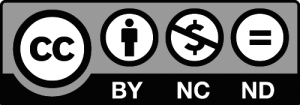
NOVEMBER 2020 / APRIL 2021
Director: Dra. Arq. Rita Laura Molinos
Editor: Dra. María Ledesma
Coeditor: DG. Miguel A. Santángelo
Technical editor: DG. Emiliano M. Eseiza
© The contents and metadata of this magazine are licensed under Open Access CC BY-NC-ND 2.5 AR
DNDA registration of the digital edition in process

Contents
General thematic articles
The river environment as landscape perception. Research and teaching of sustainability
Gabriel Burgueño
Abstract
This contribution gives some ideas, routes and evidence regarding the construction of knowledge and the landscape teaching in terms of the river environment. For this three moments to think are exposed: the river environment from the view of landscape, the original landscape as a reference and the projects to the present.
Design, accomplice and victim, is it agonyzes like the Eros? From a beloved son of modernity to a facilitator of self-alienation and a victim of the modernity of the XXI century
Cecilia Mazzeo
Abstract
Design as a social practice is unthinkable outside of the processes that characterized modernity. Its raison d’être has its roots in the growth of cities, the greater complexity and diversification of communication, changes in the production systems of objects and spaces, and their impact on the social sphere. Similarly, today you need to understand yourself immersed in the characteristics of contemporary society, both when analysing its practices and those who carry them out. This work proposes a sociological look at both processes with the aim of expanding contemporary perspectives.
Design practice, History and Theory. Inferences in the building of architectural knowledge
Lucas Gastón Rodríguez
Abstract
The article proposes a development on the construction of architectural knowledge, based on the project process. For this purpose, presents a description of the project as an epistemological-disciplinary field, defines and characterizes the project process, and describes aspects of interconnection between Praxis, History and Theory. In conclusion, the interaction of the project’s practices is linked to the problematization in historical perspective and conceptualizations from disciplinary and human positions. The article rescues the methodological dimension, technical dimension and theoretical dimension that participate in the construction of the project; integrating skills, knowledge and values, from the knowing how, the knowing and the knowing how to be.
The emergency of sociology and urban sociology. The development of the discipline in Argentina
Verónica Paiva
Abstract
The article addresses the process of emergence of Sociology as a discipline in the nineteenth century and the different schools of Urban Sociology that are recognized as such internationally. Theorists like George Simmel, the Chicago School, the French School of Urban Sociology, and some current theorists like Saskia Sassen and David Harvey. Towards the end, he briefly covers the beginnings of Urban Sociology in Argentina within the Institute of Urban and Regional Planning (IPRUL), in Rosario, in the 1960s.
Formative experiences and student strategies in the public university. Industrial Design at Universidad Nacional de Córdoba
María Belén Franco
Abstract
This work presents the experiences of students of the Industrial Design career of the Faculty of Architecture, Urbanism and Design of the Universidad Nacional de Córdoba, based on the interviews carried out by students of the last levels of this career. The work is structured in the light of the research of Marcela Sosa and Daniel Saur, in which the authors studied the experiences of students in various careers of this university, under aspects such as temporality and group status, among others.
City halls in Buenos Aires province: civic materialism in action
(1936-1940)
Santiago Pérez Leloutre
Abstract
Between 1936 and 1940, 26 city halls were built in the province of Buenos Aires, out of some thirty projects. These architectures, approached by historiography from their aesthetic, typological qualities and in relation to the biography of their authors, have overlooked their relevance as tools used by politics. In this work we propose to relocate these buildings in their production context, approaching them from the notion of civic materialism, understanding the latter as a way of building consensus from the material side by a policy particularly questioned in its legitimacy.
Necessary know-how. Revaluating the project’s didactics. Pancho guedes and the alterative modernity
Marcela Brkljacic y Esther Giani
Abstract
This article is about the need to govern the electives within the educational programs for architecture. The focus is on the subsidiary teachings involved into prefiguration. We claim for necessary incursions into the world of Arts and figuration. We propose the experience of Pancho Guedes, a versatile artist who crossed many figurative worlds, for the fundamentals and indispensable knowledge to govern the overall projectual process, from its ideation to its representation. The aim of this article is a call for awareness: the loss of sensitivity is such a widespread condition that we should be alarmed.
Assessment experiences of urban parks in cities. Regional contexts, prospective for Colombia
Lina Johana Medrano Álvarez y Julián Rodrigo Quintero González
Abstract
Urban parks are a type of urban infrastructure with broad environmental, social and economic benefits for cities; therefore, valuation methods are required that allow for proper management and planning. The objective of this work is to inquire about experiences in the valuation of urban parks in diverse geographical contexts. The methodology is oriented to the exposition of the implemented studies, their objectives, methods and findings, to then propose a prospective for Colombia. The results show the variety of studies and their approaches in the global, Latin American and Colombian context. It concludes on the variety of tools and instruments applicable to studies and research around urban parks and the need to implement similar initiatives with criteria of urban sustainability in Colombian cities.
The urban river through the social-ecosystemic perspective. The case of Atemajac river in Guadalajara, Mexico
Jorge Alberto Navarro Serrano y Dulce Esmeralda García Ruíz
Abstract
The changes in the hydric space from the installation of communities in rivers, make the conformation the water landscape and the urban river in the cities actually; in this field, presents the investigation about Atemajac river in Guadalajara, Jalisco, which history is relevant to generate human establishments, energy for factories and mills and the catering by the water resource to Guadalajara, which growth make the alteration and a few use of the river bed and generate problems of floods por the little infiltration in a urban floor and the lack of green areas. At the same time, the river environment space has, from pass process, heritage vestiges that have an important rooting in the neighbours. Both situations make a potential than can include the hydric rescue, landscaping and social, which one, count with more and best green areas than make better the hydric situation, and with this, a major availability of water and the creation from a local perspective of self-sufficiency in the city of Guadalajara like a sustainability measure.
Powerful bridges. The use of technologies in design teaching
Andrea Roxana Wengrowicz
Abstract
The article presents research results that account for the intersection between design teaching, inclusive education and technologies and offer categories to review teaching practices in the Facultad de Arquitectura, Diseño y Urbanismo of the Universidad de Buenos Aires. As teachers we are constantly concerned that didactic strategies can create better conditions that favour understanding and active and committed participation of students. We consider technologies as powerful bridges. From the possibility of promoting the inclusion of students with disabilities to shorten the distance between the academy and professional practice.
Interjurisdictional watershed management in metropolitan regions. The Argentina, Brazil, Colombia and Spain cases
Nadia Melisa Caruso López
Abstract
This research analyzes the watershed management from four river basins: Matanza-Riachuelo, Argentina; Tieté, Brazil; Medellín, Colombia and Bilbao, Spain. The results show that the complexity in basin management objectives has been increasing, which creates a broad spectrum of variables involved and limited strategies and methods to implement plans and concrete actions. The conclusions display that some common strengths in the river basins are: coordination challenges among stakeholders, difficulties to harmonize jurisdictional competence, diversity of interests, high complexity demographic and problems of linkage among land use, informal settlement processes and water management.
Three urban fluvial territories reinvented from design didactic
Karina Mellace y Dimas González
Abstract
Multiplicity and complexity perceptible in urban territories intertwined with river systems –particularly in the Paraná-del Plata basin– extend invitation to unveil tangible and subjacent presences condensed in its landscapes. Self-evident or subtle interpretations, these findings are valuable support to consolidate meaning and provide context in urban design learning.
The proposed inquiry enables a didactic structure organized around two catalytic concepts: fluviality and utopia.
Built on these concept fields, multiple imprints become available to imagine deeply integrated designs in a fringe where geography, urban structuring, politics and culture converge. A convergence that implies our conceptualization of the urban domain, manifested in the landscape as a reflection of its territory.
Under these premises, this article’s goal is to share our experience on urban design teaching, aiming
to issue a record of this process and giving account of our disciplinal approach, engagement strategies, pedagogical positioning, and foremost, the particular sensitivity from which it is possible to embrace urban design courses with a renovated horizon for practicing and learning in design degree level.
Review
From the center to the suburbs
Lorena Vecslir
